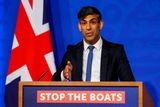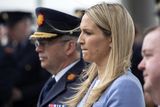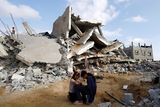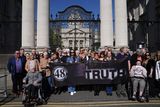Editorial: As Iran raises the stakes, diplomacy and reason is called for in the Middle East
A person walks past graffiti on a wall in Tel Aviv yesterday. Photo: Reuters
The prospect of an all-out regional war in the Middle East is now all too terribly real. The shadow war between Israel and Iran is out in the open. Iran launched hundreds of missiles and drones towards Israel late on Saturday night and into Sunday morning. The Israeli Defence Forces (IDF) said 99pc of the more than 300 bombs fired by Iran were intercepted by Israel and its military allies.
Iran said the attack was in retaliation to an Israeli strike on the Iranian consulate in Damascus, Syria, earlier this month, which killed Iran’s top military leader and other commanders.
Israeli ministers say they will respond to Iran’s attack, but the tactics, targets and type of assault to be deployed have yet to be determined.
Israeli defence minister Yoav Gallant says the confrontation with Iran is “not over yet”. In a proxy war, Iran has been providing aid to groups across the region, including Hezbollah in Lebanon, the Houthis in Yemen and Hamas in Palestine.
Since the attacks by Hamas on Israel on October 7, the exchange of fire between the IDF and Hezbollah has intensified on Lebanon’s southern border with Israel, where Irish soldiers on United Nations duty seek to keep the peace. Israel has ordered the evacuation of communities along that border as Hezbollah has fired greater numbers of missiles.
But this attack by Iran is a direct nation-on-nation attack and the Middle East has been plunged deeper into uncharted waters.
US president Joe Biden has told Israeli prime minister Benjamin Netanyahu that America will not participate in any offensive operations against Iran.
However, his opponent in the presidential election, Donald Trump, repeated a 2018 threat to the president of Iran and said the US would not stand for “demented words of violence and death”. Tehran has warned it will strike again with even greater force if Israel or the US retaliate for the Iranian strike.
With the Damascus attack, Israel showed it was intent on directly eliminating the Iranian leadership in Syria. Tensions are high and there is a real danger of escalation across the region, potentially drawing in other allies into the conflict. The UN Security Council prepared to convene an emergency session and leaders in the Middle East and in the West have expressed concern over Iran’s attack and have called for de-escalation. The condemnation of Iran has been mixed with calls for a ceasefire by Israel in Gaza.
The EU’s foreign policy chief Josep Borrell has called for an “extraordinary” meeting of EU foreign affairs ministers to discuss Iran’s attacks against Israel. Tánaiste and Foreign Affairs Minister Micheál Martin will be present and will join with EU colleagues in calling for all sides to de-escalate and for an end to the war in Gaza.
Mr Martin condemned Iran’s attack on Israel, saying the situation in the Middle East is now extremely dangerous. In a troubling time, politics, diplomacy and reason is called for – not volatile rhetoric.
Join the Irish Independent WhatsApp channel
Stay up to date with all the latest news















